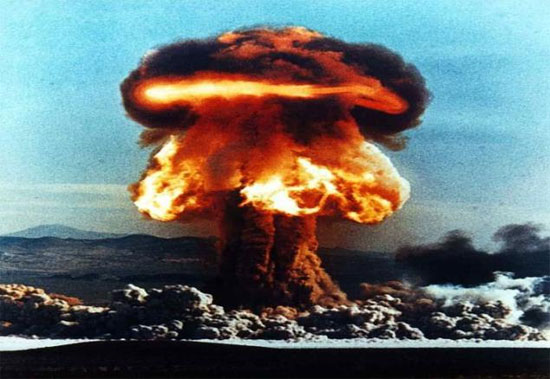Earth temperature may change because of nuclear war
Smoke, dust from a nuclear explosion can cause temperatures in many areas of the earth to drop by 2 degrees C.
Recent tensions on the Korean peninsula have made pessimists worried that the US and North Korea could use nuclear weapons to attack the enemy. Since atomic weapons appeared on Earth, the fear of nuclear war risk never disappeared. Although humanity has witnessed the catastrophic consequences of nuclear weapons in Japan during World War II, we still cannot imagine the consequences of a comprehensive nuclear war (parties using nuclear weapons). personnel to attack each other) for civilization.
Alan Robock, deputy director of the Center for Environmental Forecasting (CEP) at Rutgers University in the US and also professor of atmospheric science, and colleagues built computer models to predict gas phenomena. Post-abnormalities can occur when the nuclear war scenario between India and Pakistan becomes reality, the Rutgers University website reported.

Average temperature in many areas on earth
can be reduced to 2 degrees Celsius after nuclear explosions.
According to calculations by Dr. David Albright, an expert of the International Institute of Science and Safety and Mr. Robert S. Norris, an expert of the US and India Natural Resources Protection Commission, there are about 50 to 60 dancers. nuclear gas, and Pakistan has about 60 weapons. The weapons tests of the two countries show that the power of each weapon is equivalent to 15,000 tons of TNT (with the atomic bomb 'Little Boy' that the US dropped on Hiroshima city, Japan in August 1945).
Robock's models show that, assuming the war broke out, each side used 50 nuclear weapons to hit the enemy city, then surely the explosions would generate a certain amount of pressure, heat radiation, ion radiation. and giant radioactive dust. The amount of smoke coming out of those explosions could reduce the temperature in most parts of North America, Europe and Asia by about 2 degrees Celsius. Black smoke from fires will fly to the upper atmosphere. absorbs sunlight, resulting in reduced darkness, temperature and rainfall. Even smoke can narrow the ozone layer - a consequence that the atmosphere will take 10 to 100 years to overcome.
In addition to environmental damage, nuclear war also directly causes disasters to human life and health. In a study by the University of Colorado (USA), scientists analyzed the level of influence on people based on data sources on the number of nuclear weapons on Earth and population density in cities. Big city in the world. They only focused on the effects of black smoke escaping from a nuclear explosion accompanied by fire storms. The results show that, with a regional nuclear conflict, each country involved may lose between 2.6 million and 16.7 million lives.
- Earth's temperature changes abnormally hot and cold
- What happens to the Earth after a nuclear war?
- Science warns: The Earth is falling into a catastrophe comparable to a nuclear bomb
- Elevated Earth temperature makes the lizard change sex
- Earth temperature increased by 0.3-4.8 degrees C in this century
- The Earth will increase by nearly 6 degrees Celsius by 2100
- Variation of Earth temperature for nearly 140 years
- Climate change due to nuclear war
- The temperature of the Earth will be warmer or cold in the future?
- The amount of nuclear warheads can destroy the Earth
- The temperature of the Earth approaches
- The temperature of the Earth is at an increased risk of 5 degrees Celsius
 Is the magnetic North Pole shift dangerous to humanity?
Is the magnetic North Pole shift dangerous to humanity? Washington legalizes the recycling of human bodies into fertilizer
Washington legalizes the recycling of human bodies into fertilizer Lightning stone - the mysterious guest
Lightning stone - the mysterious guest Stunned by the mysterious sunset, strange appearance
Stunned by the mysterious sunset, strange appearance